Month 3:22, Week 3:7, Year:Day 5941:81 AM
2Exodus 7/40, Omer Count: 7 Sabbaths + Day #14
Gregorian Calendar: Saturday 13 June 2020
Philemon II
The Pauline Core of Gospel Living
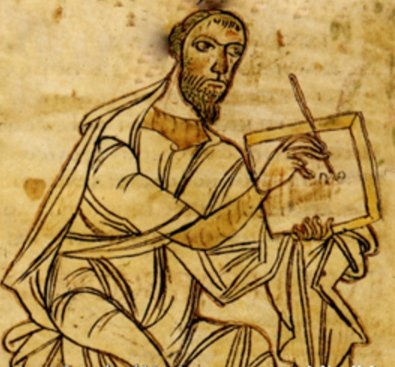
Continued from Part 1
Introduction
Shabbat shalom, and welcome to the second and final part of our study of this little known and much neglected epistle of Paul to Philemon which you may remember from last week's discussion N.T.Wright called "the showcase behind Paul's theology". By the time we finish today, I hope you'll see the truth of that even more.
About Messianic Inter-Personal Relationships
Paul's letter to Philemon isn't a theological treatise at all - it's the Besorah (Gospel) in full action. In fact, in my opinion, this letter should be the first of Paul's writings to be read and studied because it both telescopes us into Paul's heart as well as illustrating perfectly the dynamic of messianic inter-personal relationships in a pagan society that to all intents and purposes was a different cultural universe to the one we live in 2,000 years later.
The Modern World and the Ancient Slave World
The notion that 6 or 7 out of every 10 persons was a slave back then makes absolutely no sense to us here in Sweden or in the West generally. Theoretically, at any rate, every one of us is a free man or woman. We are more or less free to choose the lives we want to live, more so than at any other time in history. It's not like that everywhere around the world in our day, of course. As I was at pains to point out last week, human trafficking is still happening on a massive scale, more visibly in parts of the world where Sharia law is in operation (like Libya with its African slave markets organised by the 'Religion of Peace'), less visibly here in the West, though the underground world of slavery is, in fact, vast, which is why you can never be too careful. And people in the highest positions in society are seriously involved with it. Even in America one hears stories of children being kidnapped in parking lots and then being 'disappeared' for use in sex-slave trafficking and even ritual sacrifice.
Was Philemon Written in Rome or Ephesus?
Before we get started today, I want to clear up one discrepancy from last week as scholars are not clear as to whether this letter was written from Rome where Paul was a literal prisoner in physical chains with a Roman soldier guard, or whether from Ephesus as a free man as a spiritual or metaphorical "prisoner (slave, bond-servant) of Messiah Yah'shua (Christ Jesus)" (v.1, cp.v.23). Philemon is usually grouped together with Ephesians, Philippians and Colossians as one of the literal 'Prison Letters' written around AD 60. I suggested last week that Onesimus had fled to Rome in order to 'disappear' in the great imperial metropolis. But another equally valid explanation of his movements, based on the evidence that we have (and this is certainly the view of leading historian N.T.Wright) is that Onesimus, in fact, fled from Colossae to the nearest large city, namely, Ephesus where Paul was resident. It all depends, I suppose, on how much money he had stolen from Philemon and how far it would have got him. It's certainly more plausible that it only got him as far as Ephesus if only a smallish sum was involved, which as I said last week was only a day or two away from his master's house. He may have got to Ephesus, run out of money, and bumped into Paul who was his last hope. I can wrap my head around both scenarios so we can entertain both as possibilities.
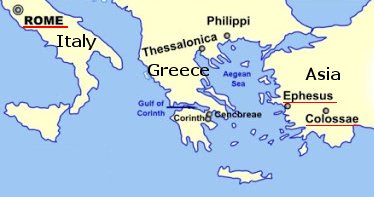
The Real Fears of Onesimus and Philemon
Paul, as you will remember, instructs Onesimus to go back to Colossae and to his master Philemon, a big risk for this runaway slave because he had no idea how his master would react. You can picture the feelings on both sides - Onesimus terrified that he might be crucified, or (the most lenient possibility) flogged and branded, and you can equally picture Philemon being concerned about the repercussions in society for him if he received Onesimus without inflicting any sort of punishment at all on the miscreant. A comparison might today be the same sort of way that modern conservatives are shocked at the way the modern liberal state seems to care more about the rights of criminals than it does about their victims, and vice versa. Philemon's non-Christian neighbours, friends and acquaintanes would have been dead against Onesimus being let off so lightly and for a variety of reasons. Everything in that pagan society would have been strongly opposed to the Christian way of forgiveness that Paul asks of Philemon. They would have viewed it as a wedge in the very fabric of their slave-based society, a threat to their prosperity, and would have feared for the stability of their own households and society in general. It would have been 'rocking the boat' in a major way and people don't like that as I discovered to my chagrin when I tried to warn Swedish homeschoolers against their softly-softly approach to the liberal government. (In the end they banned homeschooling and most fled the country to avoid having their children abducted by the state).
Practical Excuses Philemon Might Have Made
Imagine if the slaves of Colossae and environs had got it into their heads that running away might not be such a bad idea after all because it might mean, if they failed, a light punishment or, if they succeeded, emancipation (which is clearly what Paul wanted for Onesimus, if Philemon would grant it to him). The whole Roman slave-based system might potentially have ground to a halt if such had 'caught on' (which, of course, it wouldn't - I'm sure you've all heard of Spartacus who was one of the instigators behind the slave uprising in the Roman Republic a century earlier which led to a bloody war). Philemon could have countered Paul's wishes with any number of practical arguments like this, as we often do when seeking ways not to do things the way our Master Yah'shua (Jesus) expects of us that run counter to the contemporary culture and its expectations as far as inter-personal relationships are concerned.
Outflanking the Flesh With the Gospel
Yet Paul knew all Philemon's arguments in advance and sought to outflank them with the Besorah (Gospel) of their mutual Saviour. You see, Paul's argument was, as is true, that he, Onesimus, and Philemon, like all born-again or spiritually-regenerated believers, including us, were themselves slaves or household servants in the House of our Master Yah'shua the Messiah (Jesus Christ).
Difficult Decisions to Be Made
Realise that the Besorah (Gospel) is far more than about just 'getting saved' in a spiritual sense and then carrying on as before. It's about the lordship of King Yah'shua (Jesus) over the real, concrete world, in whatever culture you happen to be living in. That lordship extends to our personal lives above and beyond simply living the 'Torah-lifestyle'. It's about the Master's sovereignty over every decision we make, both the easy and difficult ones. And Philemon has some really difficult decisions to make for his own time. 2,000 years on we have equally difficult, albeit different, decisions to make, because our world respects even less than what was respected 2,000 years ago in some cases, like traditional authority structures in the home that today are anathema to feminism and Marxism, for example.
The Partnership of Faith
I think the key passage in this short letter is verse 6 so let's read that again but this time I'm going to use N.T.Wright's translation and contrast it with another modern-ish version:
"My prayer is this: that the partnership (koinonia) that goes with your faith may have its powerful effect, in realising every good thing that is at work in us to lead us into the king" (Phm.6, Kingdom New Testament - KNT).
I like the way the New English Bible (NEB) translates this passage too:
"My prayer is that your fellowship (koinonia) with us in our common faith may deepen the understanding of all the blessings that our union with Christ brings us (or 'that brings us to Christ')" (Phm.6, NEB).
Sharing to be Productive
This gives us a big clue to the inner meaning of the whole letter when he tells the addressee - Philemon - what he's praying for, as he does in a number of his other letters. What is Paul praying for? He is praying that the kononia - "partnership" (KNT), "fellowship" (NEB, NASB, HRV), or "sharing" (NIV, NRSV, NKJV, ESV) - which he and Philemon have in the Besorah (Gospel) will be productive, that it will have the effect it's meant to. Each element in this is really important, so we need to unpack this and lay all the various elements out side by side.
Like Being in Business Together
What does Paul mean by calling the relationship between himself and Philemon a "partnership"? It means they're in business together as brothers-in-Christ so they must be loyal colleagues. You can't run a business unless the partners are loyal, faithful, or true to one another. When unbelievers are converted and spiritually regenerated, they too are brought into partnership in the Besorah (Gospel).
Better Still, a Marriage Partnership
A business arrangement is not perhaps the best example but near enough - a marriage relationship would be better and indeed Yah'shua (Jesus) likens the relationship between Himself and the Messianic Community (Church) as being like a marriage, only Yah'shua (Jesus) is the Bridegroom, Husband or Master/Head and we are collectively the plural 'wives' who have to get on with one another, just as Leah, Rachel, Bilhah and Zilpah had to partnership together as the wives of Jacob (Israel), raising the fathers-to-be of the Twelve Tribes of Israel, an eternal pattern inscribed in the very gates of the New Jerusalem, even if the relationship didn't work as well as it should have done because of rivalry between the wives and a failure on the part of Jacob to love equally until, that is, he overcame his carnal nature (and the surviving three wives too, presumably, after Rachel died), and because he overcame was renamed 'Israel' by the malak (angel).
Enabled by Messiah
But we, unlike them, have been given the New Birth in Christ to enable us to forge such a working partnership serving our allegorical 'Husband'. Nevertheless, the call to put the fleshy, selfish, trickster 'Jacob nature' to death in Christ so that the 'Israel nature' can ascend remains ours as much as it did that of the ancients. We are not excused in blaming 'Jacob' when we cling on to him and refuse to die to self. The atonement of Messiah now enables us to do what the ancients never could. Now we have no excuse.
Choosing Between Authentic and Unauthentic Faith
The point is this...and it's a major point: this is the living partnership that is intimately connected to our emunah or faith. If there's no authentic partnership or fellowship or sharing, then at best the 'faith' we profess in Christ is defective, and at worst, completely fake.
Partners in a Sacred Enterprise
This is the crux: when people truly believe the Besorah (Gospel, Good News of Yah'shua the Messiah/Jesus Christ), then they are brought into that partnership with all others who believe in it. We are partners together in a sacred enterprise, the most important one there is. We're in an extended family, a kind of spiritual marriage with all that implies as far as commitment and loyalty are concerned. And it's far more than being on some company's Board of Directors.
The Isaiah 4 Model
So when Isaiah says, prophetically, that "seven women shall take hold of one man, saying...let us be called by your name" (Is.4:1, NRSV), he is using the imagery of a complex, plural marriage to describe the partnership that is supposed to exist between believers who take upon themselves the Name of Messiah by covenant and by sacrifice; for only by means of such a partnership together in Him can the "disgrace" of sin be removed from us. And that, Isaiah says, will be "the day the branch of Yahweh will be beautiful and glorious, and the fruit of the land shall be the pride and glory of the survivors of Israel" (v.2, NRSV). And that is a picture of the spiritual fruit that comes forth from such a partnership.
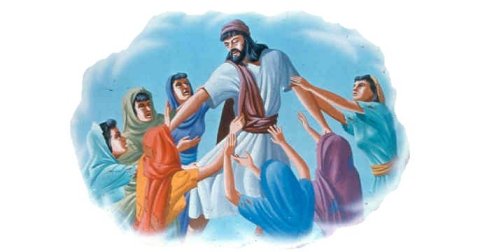 The Isaiah 4 prophecy is a picture of Messiah and His uniplural Bride
The Isaiah 4 prophecy is a picture of Messiah and His uniplural Bride
Working Together in Service for the King and Kingdom
This partnership has a powerful effect, as all true unity in truth and righteousness does. For, as the Torah declares (Dt.19:15), and as Messiah reiterates (Mt.18:16,20 cp. 2 Cor.13:1), where two or three work together in the service of the Besorah (Gospel), new things begin to happen that were previously thought to be impossible. Seven, in the Isaianic prophecy, is a picture of unity in completion - it's also the number of the Melchizedek Priesthood. This kind of unity is what all partners want as represented in the Davidic Marriage Partnership [1]. So when Paul puts it the way he does, Philemon will, of course, be agreeing with him wholeheartedly as a fellow believer! Now, whether he will still agree with him when he sees what Paul has in mind is another matter entirely!
Epignosis - Putting into Practice
Let's now take a careful look at the second part of verse 6 to see what it has to tell us:
"My prayer is this: that the partnership (koinonia) that goes with your faith may have its powerful effect, in realising (epignosis) every good thing that is at work in us to lead us into the king (Yah'shua/Jesus)" (Phm.6, KNT)
or
"in giving us an ever deepening understanding of all the blessings which have become part of our life, and so may lead us nearer and nearer to Christ" (Ibid, Barclay).
Now N.T.Wright's choice of the word "realising" (KNT), from the Greek epignosis, means not only 'recognising and knowing' but also, critically, 'putting into practice'.
Action-Knowing
Epignosis (which as you will have noticed is a compound of epi, an action prefix - and gnosis meaning 'knowledge') is a special kind of 'knowing' because it isn't passive. Just as love without truth isn't love, and truth without love isn't truth, so in the biblical sense love and truth have no life or ultimate meaning unless they are actively walked.
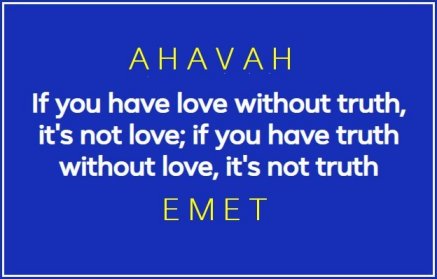
Walking Truth and Life
Hence Yah'shua (Jesus) calls Himself (and notice the order in which He gives them) "the Derech (Way), the Emet (Truth) and the Chayim (Life)" (Jn.14:6) with life itself, like truth, insisting that it must be in, and therefore come from, Christ Himself. We 'walk' truth and life - truth and life don't walk us. Accordingly, and as this passage of Scriptrue testifies, Truth is a Person, Love is a Person, Life is a Person - they are not abstract philosophical ideas even if we may on occasion examine them in such a way in order to put them under the reductionist's microscope - and 'walking the way' must be according to the walking of Christ Himself. There is no such think as truth and life - and therefore love - without personhood.
Divine Corporatism and Family
You see, the Besorah (Gospel) is not a philosophical idea but a living activity - it must 'move' in order to manifest and work. The Besorah (Gospel) is only at work in believers by the power of the Ruach Elohim (Spirit of God) because it is an animated thing, it is a 'life lived', and it must be lived cooperatively with others of the same, mind, will, and heart shaped by the same truth. This is the essence of 'divine corporatism', or working together in echad unity. Indeed, life is a very 'family' sort-of-thing.
No Solo Christians
There are, as I have said so many hundreds of times, no private, solo Christians! Such a species does not exist because one who is born again is driven by an insatiable desire to have koinonia, fellowship or partnership with other like-spirited souls. If you do not feel compelled to find that unity with other believers, then you are animated by something else calling itself 'Christian' in name only. Solo Christians eventually go extinct because they are unable to 'spiritually reproduce' alone. Beware of 'lone sheep' - they invariably need rescuing (Mt.18:11-14)!
As the Ruach Presses Outwards to Others
As the Ruach (Spirit) does its work in the 'two or three gathered together in Yah'shua's (Jesus') Name', it produces new things, good things, new ways of living for individuals, households, congregations and communities. This kind of Ruach/Spirit-working spreads or radiates outwards. That's why the Amplified Version (AmpV) of the Bible rightly (in my view), and pretty much uniquely, translates Luke 17:21 as "the kingdom of Elohim (God) is within you (in your hearts) and among you (surrounding you)" because it is in the nature of the Ruach/Spirit-infused Kingdom essence and power that it demands to break out of the individual (being multiplied and replenished there in the process, mind you) and to spread out among others, forming a community.
The Glory of Complex Multicellularity
It's an outward moving force, it cannot be imprisoned within, it has to be shared and lived together with others in order to be properly renewed, because life isn't just unicellular - the glory of biological life, at any rate, is multicellular, complex and magnificent, like a human being, which is the pinnacle of life forms made by the Creator. And as the Ruach haQodesh (Holy Spirit) thus presses, moves and works, so Yahweh produces new things, good things, new and improved ways of living for individuals, households, congregations and communities.
Becoming Part of the Family of Christ Through Baptism
Here is the important signpost that we're on the right track, the evidence that the Ruach (Spirit) is working in us: the new things that are at work in us lead us into the King which is a central Pauline idea. The King, with His Kingdom, is the Messiah Yah'shua (Jesus) Himself. When people choose to believe in the King and live the 'Kingdom lifestyle' (the New Covenant Torah), joining His visible earthly family through baptism, they become a 'part' of Him, rather like a wife becoming 'part' of her husband.
A Man's DNA in a Woman's Brain
We know scientifically from work done in 2017 at the University of Seattle and the Fred Hutchinson Cancer Research Center that once a couple have consummated their marriage, that a woman thereafter carries her husband's DNA in her brain, marking her as belonging to him. The researchers eliminated the possibility that the male DNA came from pregnancy through carrying a male child when it was clear that women had this DNA who had never been pregnant. And once that DNA is there, you can never get rid of it because they have monitored women carrying this DNA and know it's been there for up to 50 years. What effect this male DNA has on a woman's brain is not known but it should cause us to pause and think. This understanding takes the phenomenon of ungodly soul-tie connection down to a molecular level and emphasises the need for chastity and marital fidelity [2].
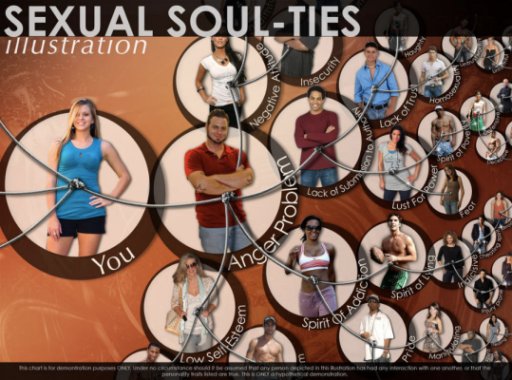 Chains of sexual soul-ties bring destructive forces into a marriage
Chains of sexual soul-ties bring destructive forces into a marriage
Feminist Reaction
Not unsurprisingly feminists have vigorously contested this data and have desperately tried to prove the male DNA in a woman comes exclusively or primarily from carrying a male baby - statistically there is a small probability that it might but the overwhelming male DNA in a woman's brain is from male sexual partners. What, in any case, is the male doing in the woman's brain in the first place? And why doesn't a man store the DNA of his female sexual partners in his brain? According to our understanding, it is tied in with identity and divine tavnith (pattern).
 The male DNA of a woman's sexual partner(s) always remains in her brain
The male DNA of a woman's sexual partner(s) always remains in her brain
Cutting Across All Barriers
The main reason I bring this up, though, is that Yah'shua (Jesus) marks us in a similar way - men and women alike - once they have received His 'spiritual seed', namely the Ruach haQodesh (Holy Spirit). The sign that that 'spiritual seed' is present is that fellow believers grow together in ahavah/agapé-love, cutting right across all traditional racial, socio-economic and cultural barriers that have a tendency to separate human beings from one another. This is what Paul meant when he wrote to the Ephesians:
"And He Himself gave some to be apostles, some nevi'im (prophets), some evangelists, and some pastors and teachers, for the equipping of the qodeshim (saints, set-apart ones) for the work of ministry, for the edifying of the body of Messiah ('building up the King's Body' - KNT), till we all come to the unity of the faith and of the knowledge of the Son of Elohim (God), to a perfect man, to the measure of the stature of the fullness of Christ" (Eph.4:11-13, NKJV).
Tearing Down Walls of Partition
Thus if the King is to be complete, Christians/Messianics of all nationalities and kinds must come together 'into' Him as the result of the spiritual DNA-seeding - Yehudim (Judahites, Jews) and Greeks, men and women together. 'And Philemon,' Paul is saying, 'slaves and free must come together too.' All class and caste barriers - artificial social dividing walls - of any and every kind are to come down, what the King James Version (KJV) calls tearing down 'walls of partition' (Eph.2:14), in Messiah.
The Apartheid Illustration
In modern times we have faced parallel situations. For example, the forced apartheid of the blacks by the white government of South Africa from 1948 to 1994, followed by the forced apartheid of the whites by the black government which has spiralled out of control into the genocide of white farmers and the ruination of the economy that is rapidly heading toward civil war and complete collapse like Zimbabwe. Though not all denominations are so radical, it worries me that many South African churches have split along ethnic lines and have adopted many of the wholly unchristian attitudes of the political extremists. There are not only new walls of partition in the short-lived 'rainbow state' of Nelson Mandela but those on the other side of it are being mudered too and encouraged to do so by a Marxist state-sponsored climate of racial hatred. There is no 'black' and 'white' in the Kingdom either. There are only believers.
The Core of the Gospel is Grace
The core of the Besorah (Gospel) of Yah'shua the Messiah (Jesus Christ), so beautifully exemplified in Paul's letter to Philemon, is a certain kind of 'love', specifically love that is undeserved or unmerited. The Greeks called it agapé and the Hebrews ahavah and chesed (mercy). This kind of love is generosity in the extreme, the kind of generosity that Yahweh has shown to us sinners in sending His Son to pay the price we ought to have paid ourselves but never could have. Paul describes its qualities to the Corinthians: it is patient and kind. It doesn't envy or boast, it's not proud, rude or self-seeking. It isn't easily angered and keeps no record of wrong-doings. It doesn't delight in evil but rejoices with the truth. It always protects, trusts, hopes, and perseveres. (1 Cor.13:4-7, NIV). In the English language we call this kind of love 'grace'.
The Persuasive Force of Love
One aspect of this divine love that Paul is at pains to demonstrate to Philemon in verses 8-14 is that it is persuasive rather than compulsive. Now unfortunately persuasion can easily be misrepresented as 'manipulation', 'bullying' or 'unfair pressure'. To be sure, all these exist and are extremely ugly. Last time we talked a bit about how Paul worked on persuading Philemon to go easy on Onesimus and forgive him even to the point of hinting he might like to think about emancipating him - setting him free as a slave - because now he's a brother in Messiah. Was Paul treating Philemon wrong in the language he used?
A Subtle Interplay
Let's first of all be clear that there is
- 1. a subtle and delicate interplay between explaining something in genuine love;
- 2. having a true vision of the Besorah (Gospel); and
- 3. someone else making up their mind in the light of it.
That's how love works after all, isn't it? Let me illustrate so I am not misunderstood.
A False Idol of 'Freedom'
Supposing John loves Jane, but because he respects Jane's freedom to make up her own mind, he never speaks of his love or does anything to show it - does that actually create a context where Jane might be free to love John in return? In other words, we must beware of setting up a false idol of 'freedom' which would leave us 'free' within our own little boxes, sealed off from all love, all persuasion, all human interchange, in case our 'freedom' might be compromised.
False Accusation
Now, of course, it's always open to anyone to accuse someone of being 'manipulative', and people have sometimes wondered whether Paul was guilty of that. I certainly suggested last week, rather playfully and perhaps naughtily, I might add, that Paul might have been guilty of that a little with Philemon. But to avoid all attempts to persuade, to encourage, to show people things in a new light, because you're frightened of that accusation, would leave us all 'free' - but only 'free' to be hermits in our little caves, bereft of all human contact.
Gentle, Playful Persuasion
What's clear to me, from this short but powerful letter, is that Paul clearly knows the dangers of trying to force someone to do something. His style throughout this letter is one of gentle, almost playful, Christian persuasion, reminding me so much of the late Ravi Zacharias who was such a diplomat, whose words were always seasoned with kindness. Paul knows Philemon well enough to adopt just the right tone...and tone is important, not merely concepts, ideas or thoughts. What distinguishes Christianity, and the work of the Ruach haQodesh (Holy Spirit), is very much the 'tone'. What Paul asked of Philemon was very, very difficult indeed, especially in that time and age, but he is reasonably sure Philemon will take the point and act upon it because he is sure he is being Ruach/Spirit-led. But, just to be sure, he takes it carefully step by step.
Paul's Strategy With Philemon
If we can break this down and see the tavnith or pattern of the way the Ruach (Spirit) works, we will do so much to improve our inter-personal relationships. What's the first thing Paul does? He builds a secure foundation, namely, the relationship which he and Philemon have. Then he names the person at the centre of the problem. Then quickly, he makes it clear that when Philemon is confronted with Onesimus himself, that he is actually looking at...who? At Paul! This is the heart of his strategy in this delicate and highly skilled piece of writing. Can you imagine what we might achieve if all Christian/Messianic 'persuaders' could learn from it?! He teaches Philemon like a true father to a son...by helping him to think through the issues and come to the right decision for himself rather than issuing an edict.
The Appeal
Paul's appeal is never his authority (even though he certainly possessed it as an apostle and needed in other situations) but rather it is to his love, sympathy and affection by describing himself as 'an old man and in prison'. He was probably in his 40's or 50's which we wouldn't consider very old but you have to remember that in the world of 2,000 years ago the life expectancy was a lot lower than today. Nevertheless he would have been viewed as an 'elder' with a natural claim for respect. Having established that he and Philemon are bonded together with several strands of love, partnership, affection and respect, Paul then goes on to show Philemon that he has established a similar relationship bond with Onesmius whom he calls his "child" because this slave has become a believer through Paul's care and love [3]. And like a fond parent sending a son or daughter off into the big world for the first time, when Paul sends Onesimus to Colossai, he is therefore sending his very heart. Isn't that typically human? We really do feel that part of our own deepest self is bound up in this person or that and we feel bereavement every time we are separated from someone we love.
Seeing Paul in Onesimus
Here's the important thing that I want you to take away with you today. When a surprised Philemon discovers that his own runaway slave, Onesimus, has returned, Paul doesn't want him to just see Onesimus. He wants him to see Paul as though he, the apostle, were standing there in his place. That is the foundation of Paul's appeal in the climax of his letter in verses 15-25. Likewise when we are confronted by a Christian/Messianic brother or sister who has wronged us who has made peace with Elohim (God), Yahweh wants us to see Christ in that brother or sister for this is the Gospel way of making reconciliation. This is the only kind of reconciliation that will ultimately heal the whole world but in the meantime we are to become reconcilers ourselves - as Paul did - by this means.
Called to Be Reconcilers
Is such a way costly? Oh yes, terribly so, very much so, particularly if we have suffered at the hands of the one who now wishes to make peace with us - you can't downplay that, ever. Read the story of Corrie ten Boom for a modern example. Nevertheless we are required to forgive and reconcile in order to remain right with Yahweh...in order to remain justified and in right relationship with Him (Mt.6:12; Lk.11:4)...in the same way, on a human level, that He made peace with us through the sacrifice of His Son on the cruel and terrible Cross of atonement at Calvary. Yet when that reconciliation - that peace - has been made, it's explosive! It's what changes the desert landscape in men's souls into bountiful pastures. It's what makes the sun shine in the bleakness of a dark inner world, turning night into day. It's what salvation is really all about!
 The reconciliation of Onesimus and Philemon
The reconciliation of Onesimus and Philemon
Conclusion
There is more I would like to have said and perhaps I will do so another time but we'll end it there for now. This has been a story about restorative grace which is another way of explaining what salvation means both in our relationship to our Heavenly Father and to one another. So was N.T.Wright correct to maintain that Philemon is the showcase behind Paul's theology? Totally! We can use this letter for evangelism, pastoral care, and as a means of explaining the deeper things of Paul but basically this is what all his complicated theology is about. Have a great sabbath and until next time, Yahweh bless you all! Amen.
Endnotes
[1] Unfortunately, David, after he had received his complete prophetic seven, got greedy and, instead of being content with what Yahweh had given him, lusted after an eighth woman who was already married to another whom he murdered. His family and Kingdom were plagued with problems thereafter because he would not stick to divine tavnith (pattern).
[2] See Generational Ties
[3] Paul uses similar language in 1 Corinthians 4:14 and Galatians 4:19


V202
|


